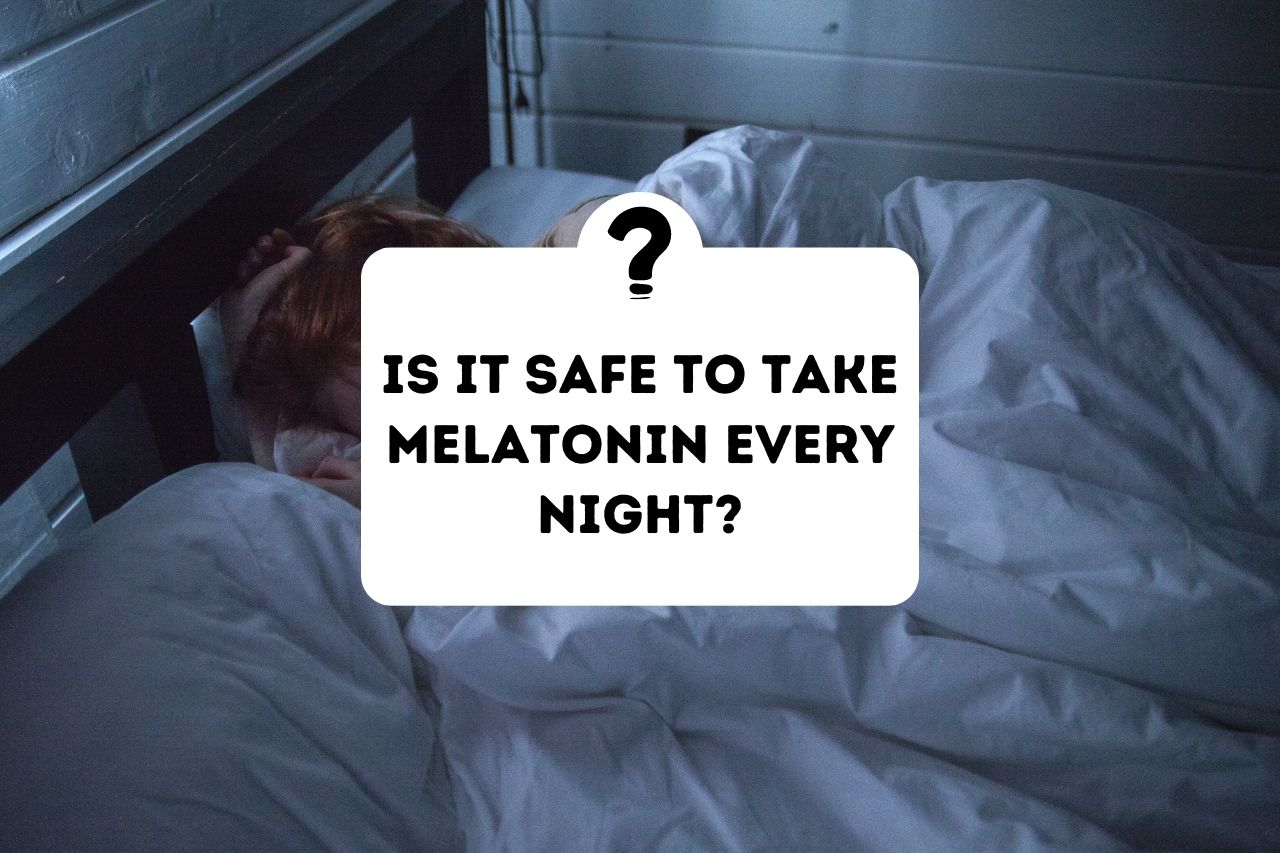is it Safe to Take Melatonin Every Night? According to recent studies and anecdotal evidence, many individuals turn to melatonin supplements as a natural solution for improving their sleep quality. However, a common question that arises is whether it is safe to take melatonin every night. In this article, we will explore the benefits, risks, and considerations surrounding regular melatonin use, helping you make an informed decision about incorporating it into your nightly routine.
Introduction
A good night’s sleep is essential for overall well-being and optimal functioning during the day. As a hormone produced naturally by the pineal gland in the brain, melatonin plays a crucial role in regulating our sleep-wake cycle. It helps signal our body when it’s time to sleep and wake up. Due to its sleep-inducing properties, melatonin supplements have gained popularity as an over-the-counter remedy for sleep disorders and jet lag.
What is Melatonin?
Melatonin is a hormone that occurs naturally in our bodies. It is responsible for regulating our internal clock, also known as the circadian rhythm. The circadian rhythm is the biological process that controls our sleep-wake cycle, aligning our body with the natural light-dark patterns of the day. Melatonin levels typically rise in the evening, promoting relaxation and preparing our body for sleep.
How Does Melatonin Work?
Melatonin works by binding to specific receptors in the brain that help regulate the sleep-wake cycle. When melatonin levels rise, it sends signals to different parts of the body, inducing drowsiness and promoting sleep onset. By mimicking the effects of naturally produced melatonin, melatonin supplements can help individuals fall asleep faster and adjust their sleep patterns.
Is It Safe to Take Melatonin Every Night?
Benefits of Regular Melatonin Use
Regular use of melatonin has shown several potential benefits for improving sleep quality. It can be particularly helpful for individuals with sleep disorders such as insomnia or those experiencing jet lag due to travel across time zones. Melatonin supplements can effectively reduce the time it takes to fall asleep and improve overall sleep duration.
Moreover, melatonin is generally considered safe for short-term use, making it a popular choice for occasional sleep disturbances. It can also be beneficial for individuals who work night shifts or have disrupted sleep schedules.
Potential Risks and Side Effects
While melatonin is generally safe, it’s essential to consider potential risks and side effects associated with long-term nightly use. Since melatonin directly influences our sleep-wake cycle, prolonged use may affect our natural production of the hormone. This could lead to decreased endogenous melatonin production and reliance on supplementation.
Some individuals may also experience mild side effects such as daytime drowsiness, headaches, or an upset stomach. However, these side effects are typically rare and subside once the body adjusts to the supplement.
Factors to Consider Before Taking Melatonin Nightly
Before incorporating melatonin into your nightly routine, it’s important to consider several factors that may influence its effectiveness and safety.
Sleep Disorders and Insomnia
Individuals with diagnosed sleep disorders, such as insomnia, may find regular melatonin use beneficial. However, it’s crucial to consult with a healthcare professional to determine the underlying cause of the sleep disorder and explore other treatment options.
Age and Developmental Stages
Melatonin levels naturally change throughout our lives. Children and teenagers generally produce higher levels of melatonin, while older adults may experience reduced production. Therefore, the appropriate dosage and suitability of regular melatonin use may vary depending on age and developmental stages.
Underlying Health Conditions
Individuals with certain health conditions such as diabetes, depression, epilepsy, or autoimmune disorders should exercise caution when considering regular melatonin use. It is advisable to consult with a healthcare professional to assess potential interactions with medications and evaluate the overall safety of melatonin usage.
Recommended Dosage for Melatonin
When taking melatonin supplements, it’s vital to follow the recommended dosage guidelines. The appropriate dosage can vary based on factors such as age, sleep disorder severity, and individual response. Typically, low doses ranging from 0.5 to 5 milligrams are recommended for most individuals. However, always consult with a healthcare professional before starting any new supplement regimen.
Consultation with Healthcare Professionals
Before incorporating melatonin into your nightly routine, it is highly recommended to consult with a healthcare professional. They can provide personalized guidance based on your specific circumstances and help you make an informed decision regarding regular melatonin use. A healthcare professional can evaluate your sleep patterns, assess any underlying health conditions, and determine the appropriate dosage and duration of melatonin supplementation.
Alternatives to Regular Melatonin Use
While melatonin can be beneficial for improving sleep quality, there are alternative methods to consider before relying on supplementation every night. Adopting healthy sleep habits and lifestyle changes can have a positive impact on your sleep patterns. Some alternatives to regular melatonin use include:
- Establishing a consistent sleep schedule: Going to bed and waking up at the same time each day helps regulate your body’s internal clock.
- Creating a relaxing bedtime routine: Engaging in calming activities such as reading, taking a warm bath, or practicing relaxation techniques can signal to your body that it’s time to wind down and prepare for sleep.
- Creating a sleep-friendly environment: Ensure your bedroom is dark, quiet, and at a comfortable temperature to promote optimal sleep conditions.
- Limiting screen time before bed: The blue light emitted by electronic devices can interfere with your body’s natural sleep-wake cycle. Avoid using screens at least an hour before bedtime.
- Managing stress: High levels of stress can disrupt sleep. Incorporate stress management techniques such as meditation, deep breathing exercises, or journaling into your daily routine.
By implementing these alternatives, you can improve your sleep quality without solely relying on melatonin supplementation.
Conclusion

is it Safe to Take Melatonin Every Night?
In conclusion, melatonin supplements can be a helpful aid for individuals struggling with sleep disorders or experiencing jet lag. When used correctly and under the guidance of a healthcare professional, melatonin can contribute to improved sleep quality and overall well-being. However, it is important to consider individual factors such as underlying health conditions, age, and sleep patterns before incorporating melatonin into your nightly routine.
Regular melatonin use may have benefits, but it is crucial to weigh the potential risks and side effects associated with long-term supplementation. It is always advisable to consult with a healthcare professional to assess your specific needs, determine the appropriate dosage, and explore alternative methods for improving sleep quality.
FAQs
- Is melatonin safe for long-term use?
- While melatonin is generally considered safe for short-term use, it’s important to consult with a healthcare professional for guidance on long-term supplementation.
- Can melatonin help with insomnia?
- Melatonin supplements can be beneficial for individuals with insomnia by reducing the time it takes to fall asleep and improving overall sleep duration. However, it’s essential to address the underlying causes of insomnia with a healthcare professional.
- Are there any side effects of melatonin?
- Some individuals may experience mild side effects such as daytime drowsiness, headaches, or an upset stomach. These side effects are typically rare and temporary.
- Can I take melatonin if I have an underlying health condition?
- If you have an underlying health condition, it is advisable to consult with a healthcare professional before starting melatonin supplementation to ensure its safety and potential interactions with medications.
- What are some alternatives to melatonin for improving sleep quality?
- Establishing a consistent sleep schedule, creating a relaxing bedtime routine, managing stress, and optimizing your sleep environment are some alternative methods for improving sleep quality without relying solely on melatonin supplementation.





